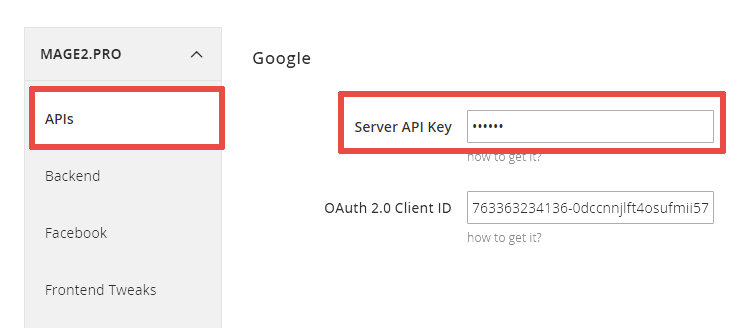Magento 2 Generate Api Key
Jun 28, 2017 Magento 2 uses Swagger to automatically generate documentation for its REST API. As the API documentation could provide internal implementation details of a site, you first need to authenticate via an api key to obtain access to the full set of endpoints. Under Authentication, click Generate New API Key. Copy and securely store the API Key in your system – you will need it later when configuring the plugin in Magento.
Does anyone know of any API key generator script/class for PHP? The class should have method generate, that would generate a key and isValid method, to check if the key is valid. Stack Overflow. PHP API Key Generator. Ask Question Asked 10 years, 6 months ago. But to active the integrated SMTP is quite complicated and needs more steps to accomplish, and the initial steps require you to generate an API key firstly, then integrate it with the SMTP extension and done! Overview how to configure Mandrill / Mailchimp SMTP in Magento 2. Get your authentication keys. The repo.magento.com repository is where Magento 2 and third-party Composer packages are stored and requires authentication. Use your Magento Marketplace account to generate a pair of 32-character authentication keys to access the repository. For access to Magento Commerce and Magento Commerce Cloud packages, you must use keys associated with a MAGEID.
The REST documentation on the Magento devdocs website is generated with Swagger UI using a schema derived from the latest build of Magento 2. However, the REST API documentation on devdocs is static in that the Magento Developers website is not running an instance of Magento, and there is no live data.
Magento provides two ways to get detailed information about the structure of the REST endpoints, as described below.
Generate a full REST reference locally
The Swagger UI is installed automatically on your server. As a result, you can generate live REST API documentation that can include Magento Commerce modules, third-party modules, and extension attributes that have been installed on your system. To view this documentation, go to:
Free api key. All requests to a search service need a read-only api-key that was generated specifically for your service. The api-key is the sole mechanism for authenticating access to your search service endpoint and must be included on every request. In REST solutions, the api-key is typically specified in a request header.
http://<magento_host>/swagger
Visio 2010 premium key generator. Microsoft Visio Premium 2010 (64-bit) takes diagramming to a new level with dynamic, data-driven visualization tools and templates, enhanced process management capabilities, and advanced Web sharing. If your computer has already joined to domain or from data saved in almost any format. Oct 16, 2016 Microsoft Visio Premium 2010 Keygen with Crack is the world’s best application to create stunning charts, graphs, organizational structure, work allocation and all branches of an office etc. It helps to create business cards, employee charts. Convert Microsoft Visio Premium 2010 Product Key trail version to full software.Microsoft Visio Premium 2010 Crack with Product Key Full Download is a vibrant part of MS Office family. It is a tool for every kind of workCreate Flowcharts & Diagrams Easily. Get Visio Pro for Only $18/MonthCreate Flowcharts & Diagrams Easily. Mar 03, 2011 Microsoft Visio Premium 2010 X86 & X64 v.14.0.4760.1000 center /center The advanced diagramming tools of Visio 2010 Premium help you simplify complexity with dynamic, data-driven visuals and new ways to share on the Web in real-time.
To view the Swagger documentation for a specific store view, use this URL:
http://<magento_host>/swagger?store=<store_code>
The value of store_code must be one of the following:
default- The assigned store code
all. This value only applies to the CMS and Product modules. If this value is specified, the API call affects all the merchant’s stores.
By default, Magento returns documentation for resources available to anonymous users across all stores. If you specify a valid value in the api_key text box in the upper right corner, Swagger returns documentation for all the endpoints the user has access to. To generate an API key, call the POST /V1/integration/customer/token or POST /V1/integration/admin/token as directed in Token-based authentication.
The generated Swagger documentation provides the capability to test REST requests. A user can enter a sample request, then press the Try it out! button, and Swagger returns information such as a curl command, a request URL, a response body, a response code, and the response header. The Try it out! button will not work unless a bearer authorization token has been specified.
The Try it out! feature is not available on Swagger documentation published on the Magento devdocs website.
REST reference for Asynchronous API
You can also use Swagger to generate live asynchronous API REST documentation. To create this documentation, add the ?type=async parameter to the standard Swagger URL:
http://<magento_host>/swagger?type=async
Swagger returns information about all resources available for asynchronous REST APIs.

Return the JSON schema for one or more services
You can use a REST client to generate the JSON schema for one or more services. In the client, set the method to GET and the URL to
Magento Rest Api Doc
http://<magento_host>/rest/<store_code>/schema?services=<serviceName1,serviceName2,.>
For example:
http://<magento_host>/rest/default/schema?services=catalogProductRepositoryV1
To return information about all services:
http://<magento_host>/rest/<store_code>/schema
You must specify an authorization token for an admin user to return information for most endpoints. See Token-based authentication for more information.
Return the complete JSON schema
Magento 2 Api Key
To return the complete JSON schema, specify the ?services=all parameter in the URL. The default store_code is all, but you can also specify default or a store code defined on the system. For example: http://<magento_host>/rest/default/schema?services=all
The base URL for returning the asynchronous schema is http://<magento_host>/rest/<store_code>/async/schema.

Related topics